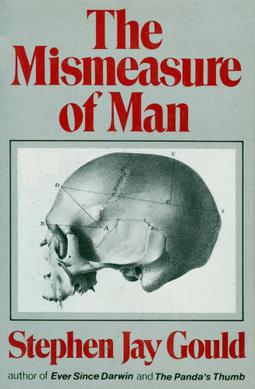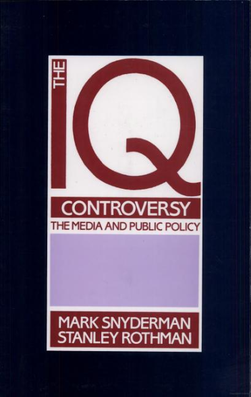Related Research Articles

Arthur Robert Jensen was an American psychologist and writer. He was a professor of educational psychology at the University of California, Berkeley. Jensen was known for his work in psychometrics and differential psychology, the study of how and why individuals differ behaviorally from one another.
John Philippe Rushton was a Canadian psychologist and author. He taught at the University of Western Ontario until the early 1990s, and became known to the general public during the 1980s and 1990s for research on race and intelligence, race and crime, and other purported racial correlations.
Discussions of race and intelligence – specifically regarding claims of differences in intelligence along racial lines – have appeared in both popular science and academic research since the modern concept of race was first introduced. With the inception of IQ testing in the early 20th century, differences in average test performance between racial groups were observed, though these differences have fluctuated and in many cases steadily decreased over time. Complicating the issue, modern science has concluded that race is a socially constructed phenomenon rather than a biological reality, and there exist various conflicting definitions of intelligence. In particular, the validity of IQ testing as a metric for human intelligence is disputed. Today, the scientific consensus is that genetics does not explain differences in IQ test performance between groups, and that observed differences are environmental in origin.

The Mismeasure of Man is a 1981 book by paleontologist Stephen Jay Gould. The book is both a history and critique of the statistical methods and cultural motivations underlying biological determinism, the belief that "the social and economic differences between human groups—primarily races, classes, and sexes—arise from inherited, inborn distinctions and that society, in this sense, is an accurate reflection of biology".

Sir Cyril Lodowic Burt, FBA was an English educational psychologist and geneticist who also made contributions to statistics. He is known for his studies on the heritability of IQ.
The g factor is a construct developed in psychometric investigations of cognitive abilities and human intelligence. It is a variable that summarizes positive correlations among different cognitive tasks, reflecting the fact that an individual's performance on one type of cognitive task tends to be comparable to that person's performance on other kinds of cognitive tasks. The g factor typically accounts for 40 to 50 percent of the between-individual performance differences on a given cognitive test, and composite scores based on many tests are frequently regarded as estimates of individuals' standing on the g factor. The terms IQ, general intelligence, general cognitive ability, general mental ability, and simply intelligence are often used interchangeably to refer to this common core shared by cognitive tests. However, the g factor itself is a mathematical construct indicating the level of observed correlation between cognitive tasks. The measured value of this construct depends on the cognitive tasks that are used, and little is known about the underlying causes of the observed correlations.
Scientific racism, sometimes termed biological racism, is the pseudoscientific belief that the human species can be subdivided into biologically distinct taxa called "races", and that empirical evidence exists to support or justify racism, racial inferiority, or racial superiority. Before the mid-20th century, scientific racism was accepted throughout the scientific community, but it is no longer considered scientific. The division of humankind into biologically separate groups, along with the assignment of particular physical and mental characteristics to these groups through constructing and applying corresponding explanatory models, is referred to as racialism, race realism, or race science by those who support these ideas. Modern scientific consensus rejects this view as being irreconcilable with modern genetic research.
The Pioneer Fund is an American non-profit foundation established in 1937 "to advance the scientific study of heredity and human differences". The organization has been described as racist and white supremacist in nature. The Southern Poverty Law Center classifies the Pioneer Fund as a hate group. One of its first projects was to fund the distribution in US churches and schools of Erbkrank, a Nazi propaganda film about eugenics.

Richard Lynn was a controversial English psychologist and self-described "scientific racist" who advocated for a genetic relationship between race and intelligence. He was the editor-in-chief of Mankind Quarterly, a white supremacist journal. He was a professor emeritus of psychology at Ulster University, but had the title withdrawn by the university in 2018. Lynn was lecturer in psychology at the University of Exeter and professor of psychology at the Economic and Social Research Institute, Dublin, and at the University of Ulster at Coleraine.

In ecology, r/K selection theory relates to the selection of combinations of traits in an organism that trade off between quantity and quality of offspring. The focus on either an increased quantity of offspring at the expense of individual parental investment of r-strategists, or on a reduced quantity of offspring with a corresponding increased parental investment of K-strategists, varies widely, seemingly to promote success in particular environments. The concepts of quantity or quality offspring are sometimes referred to as "cheap" or "expensive", a comment on the expendable nature of the offspring and parental commitment made. The stability of the environment can predict if many expendable offspring are made or if fewer offspring of higher quality would lead to higher reproductive success. An unstable environment would encourage the parent to make many offspring, because the likelihood of all of them surviving to adulthood is slim. In contrast, more stable environments allow parents to confidently invest in one offspring because they are more likely to survive to adulthood.

Linda Susanne Gottfredson is an American psychologist and writer. She is professor emerita of educational psychology at the University of Delaware and co-director of the Delaware-Johns Hopkins Project for the Study of Intelligence and Society. She is best known for writing the 1994 letter "Mainstream Science on Intelligence", which was published in the Wall Street Journal in defense of Richard Herrnstein and Charles Murray's controversial book The Bell Curve (1994).

Race, Evolution, and Behavior: A Life History Perspective is a book by Canadian psychologist and author J. Philippe Rushton. Rushton was a professor of psychology at the University of Western Ontario for many years, and the head of the controversial Pioneer Fund. The first unabridged edition of the book came out in 1995, and the third, latest unabridged edition came out in 2000; abridged versions were also distributed.

"Mainstream Science on Intelligence" was a public statement issued by a group of researchers led by psychologist Linda Gottfredson. It was published originally in The Wall Street Journal on December 13, 1994, as a response to criticism of the book The Bell Curve by Richard Herrnstein and Charles Murray, which appeared earlier the same year. The statement defended Herrnstein and Murray's controversial claims about race and intelligence, including the claim that average intelligence quotient (IQ) differences between racial and ethnic groups may be at least partly genetic in origin. This view is now considered discredited by mainstream science.
Ecological systems theory is a broad term used to capture the theoretical contributions of developmental psychologist Urie Bronfenbrenner. Bronfenbrenner developed the foundations of the theory throughout his career, published a major statement of the theory in American Psychologist, articulated it in a series of propositions and hypotheses in his most cited book, The Ecology of Human Development and further developing it in The Bioecological Model of Human Development and later writings. A primary contribution of ecological systems theory was to systemically examine contextual variability in development processes. As the theory evolved, it placed increasing emphasis on the role of the developing person as an active agent in development and on understanding developmental process rather than "social addresses" as explanatory mechanisms.

The IQ Controversy, the Media and Public Policy is a book published by Smith College professor emeritus Stanley Rothman and Harvard researcher Mark Snyderman in 1988. Claiming to document liberal bias in media coverage of scientific findings regarding intelligence quotient (IQ), the book builds on a survey of the opinions of hundreds of North American psychologists, sociologists and educationalists conducted by the authors in 1984. The book also includes an analysis of the reporting on intelligence testing by the press and television in the US for the period 1969–1983, as well as an opinion poll of 207 journalists and 86 science editors about IQ testing.
The history of the race and intelligence controversy concerns the historical development of a debate about possible explanations of group differences encountered in the study of race and intelligence. Since the beginning of IQ testing around the time of World War I, there have been observed differences between the average scores of different population groups, and there have been debates over whether this is mainly due to environmental and cultural factors, or mainly due to some as yet undiscovered genetic factor, or whether such a dichotomy between environmental and genetic factors is the appropriate framing of the debate. Today, the scientific consensus is that genetics does not explain differences in IQ test performance between racial groups.
The following outline is provided as an overview of and topical guide to human intelligence:
Anthony Francis "Tony" Bogaert is a Canadian psychologist. He is a professor in both the Departments of Psychology and of Community Health Sciences at Brock University.
Aurelio José Figueredo is an American evolutionary psychologist. He is a professor of psychology, Family Studies and Human Development at the University of Arizona, where he is also the director of the Ethology and Evolutionary Psychology Laboratory. He is also a member of the interdisciplinary Center for Insect Science at the University of Arizona. His major areas of research interest are the evolutionary psychology and behavioral development of life history strategy, cognition, sex, and violence in human and nonhuman animals, and the quantitative ethology and social development of insects, birds, and primates. He is known for his research on personality, such as a 1997 study in which he and James E. King developed the Chimpanzee Personality Questionnaire to measure the Big Five personality traits in chimpanzees.
Andrew Spencer Winston is a psychologist and historian who is an emeritus professor at the University of Guelph in Canada. He is known for his research on the history of scientific racism and eugenics in psychology. He was president of the Society for the History of Psychology in 2012, and served as Executive Officer to Cheiron: The International Society for the History of Behavioral and Social Sciences from 2002 to 2008.
References
- ↑ Rushton, J. Philippe (January 1985). "Differential K theory: The sociobiology of individual and group differences". Personality and Individual Differences. 6 (4): 441–452. doi:10.1016/0191-8869(85)90137-0.
- 1 2 "Statement from the Department of Psychology regarding research conducted by Dr. J. Philippe Rushton". Department of Psychology, University of Western Ontario.
- 1 2 Weizmann, Fredric; Wiener, Neil I.; Wiesenthal, David L.; Ziegler, Michael (1990). "Differential K theory and racial hierarchies". Canadian Psychology. 31 (1): 1–13. doi:10.1037/h0078934.
- ↑ Templer, Donald I. (October 2008). "Correlational and factor analytic support for Rushton's differential K life history theory". Personality and Individual Differences. 45 (6): 440–444. doi:10.1016/j.paid.2008.05.010.
- 1 2 Winston, Andrew S. (29 May 2020). "Scientific Racism and North American Psychology". Oxford Research Encyclopedias: Psychology. doi:10.1093/acrefore/9780190236557.013.516. ISBN 978-0-19-023655-7.
- ↑ Weizmann, Frederic; Wiener, Neil I.; Wiesenthal, David L.; Ziegler, Michael (1989). "Scientific racism in contemporary psychology". International Journal of Dynamic Assessment & Instruction. 1 (1): 81–93.
- ↑ Anderson, Judith L. (1991). "Rushton's racial comparisons: An ecological critique of theory and method". Canadian Psychology. 32 (1): 51–62. doi:10.1037/h0078956.